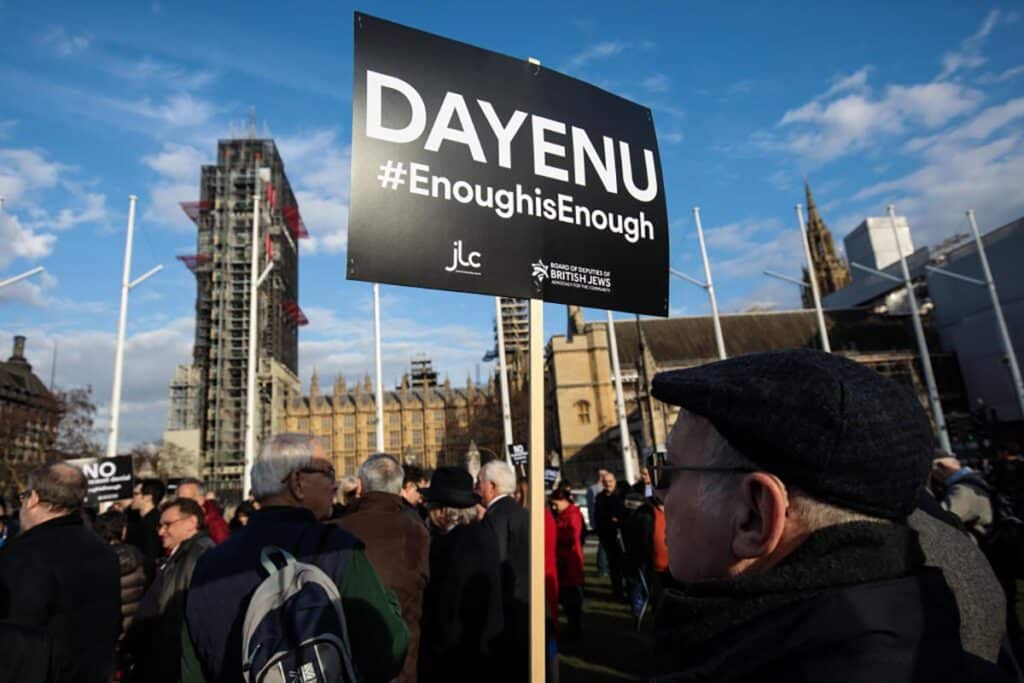
Almost two years ago, I first set foot on my college campus — a significant milestone for any student. After a full year of remote learning, I was eager to see my new home and join the community that had opened its doors to me.
The first few weeks lived up to my expectations. Having been the victim of an antisemitic event at my Anglican high school that made national headlines, it was refreshing to now be part of a place that embraced all identities and offered opportunities to delve deeper into my Jewish heritage.
But this sense of belonging was startingly short-lived. During a walk on campus, I noticed that the religious studies building — a hub for the exploration of Christianity, Judaism, and other religions and cultures — bore the name Martin Luther, a notoriously antisemitic leader (not to be confused with Martin Luther King, Jr.).
If you’re not familiar with him, Martin Luther, a 16th-century German theologian, is most well-known for initiating the Protestant Reformation. But there’s a more sinister part of his legacy.
In 1543, Martin Luther penned a notoriously antisemitic 60,000-word treatise, “On the Jews and their lies.” He advocated for horrific measures such as setting synagogues on fire, confiscating Jewish prayer books, forbidding rabbis from preaching, and destroying Jews’ homes.
His works triggered a wave of pogroms (violent anti-Jewish riots) across Western Europe and have been used as a justification for antisemitism for centuries.
Shocked that a building promoting religious diversity was named after such a person, I double-checked to confirm I wasn’t mistaken, and wondered how this name continued to be used.
After this incident, I had no idea where to turn; I wanted justice, but I figured it was unlikely to happen. The sense of kinship I’d felt just a few days prior was gone — now, I just felt angry that a leader who would have despised me just for my religion was being praised.
Unfortunately, my story is far from unique. Antisemitism is everywhere, with incidents continuing to rise, including at universities worldwide.
Although college campuses may often feel like a safe bubble away from the issues and politics of the real world, prejudice is an all-too-familiar experience for many students. At universities, antisemitism manifests in various forms, from public protests to offensive graffiti scribbled on campus property.
Dealing with antisemitism is no easy task, especially when you’re living away from home, with a full course-load and extracurriculars to tire you out. So, if you find yourself at a loss after experiencing an antisemitic event on your campus, or simply want to equip yourself with coping strategies, don’t worry — I’m here to help.
Reflect on the situation and your emotional response

Whenever I encounter antisemitism, my first instinct is a surge of anger. Acts of prejudice against Jews are distressingly frequent, and we often find ourselves standing alone against this hate while our non-Jewish peers maintain their silence.
Although some celebrities and activists may speak out against antisemitism once in a while, those voices are often the minority. The feeling that we’re the only ones sticking up for ourselves makes the pain so much worse.
Before you consider taking any action, allow yourself some time to get your frustrations out. Suppressing these negative emotions, although potentially useful in the immediate aftermath, may only make you feel worse in the long run.
So, accept everything you’re feeling and reflect in a way that works for you — whether that’s journaling, confiding in your family or close friends, or immersing yourself in a hobby that serves as an outlet for your anger. Then, once you feel prepared, you can tackle the situation with a more composed and rational mindset.
Spread awareness to the people around you
An essential step in navigating antisemitic incidents is initiating conversation with your roommates, friends, and even casual acquaintances.
Especially at college, this requires you to be proactive and initiate discussions — but once you set the discussion in motion, you’ll find many individuals are receptive and willing to engage. This may mean having some uncomfortable conversations, but it’s precisely those that can be the most beneficial for everyone involved.
Talking might seem like it doesn’t achieve much, but on a college campus, news can spread quickly — the impact of sharing your experiences can grow bigger. In fact, word-of-mouth is often the best way to create change because people working together are stronger.

By sharing your own experience with antisemitism, you help educate everyone else. This helps create a more supportive and understanding community. If we keep quiet about these problems, how can we hope to change anything?
Start by talking to your closest friends, in a setting that makes you feel at ease. You can even bring it up casually as part of a chat about your day.
For instance, you might say, “Today was honestly tougher for me; I noticed something on campus I wanted to talk to you guys about.” After asking them if it’s OK to share (nobody wants to be trauma-dumped on), tell them about the incident, making sure to provide context about the broader issue of antisemitism.
Feel free to reassure them that it’s OK to share what you’ve told them, particularly if they ask how they can help. You can also share these Unpacked videos on antisemitism to help educate them on the issue.
After taking this first step, you’ll feel more comfortable opening up with others — such as classmates, hallmates, your Residence Advisor, or even casual acquaintances.
My own experience has shown me that even a single conversation or message can make a difference. In grade 11, I noticed a concerning trend among my classmates, who were sharing antisemitic fake news on their Instagram stories. Despite not being close friends with these individuals, I felt compelled to act.
I responded gently, informing them that their posts contained offensive and false information. I followed up by sending them a credible source that contradicted the disinformation in their post and assured them I was open to any questions. To my surprise, most of them apologized, removed the story, and, I hope, took a step toward self-education.
Regulate or limit your social media intake, if needed
In the case of a larger-scale incident that provokes further antisemitic posts on social media, you might need to take steps to safeguard your mental health.
Posting about the antisemitic incident to further inform your community can be an empowering step. However, if you find yourself overwhelmed afterward, do not hesitate to regulate or even suspend your intake.
When antisemitism was on the rise in May 2021, I found it helpful to go cold turkey, deleting my apps entirely. I took time to focus on self-care and the nurturing environment of my supportive friends and family. This decision proved to be extremely beneficial for my well-being and overall happiness.
But if you prefer not to go entirely offline, you can try what has since become my social media (specifically Instagram) strategy: maintaining a separate account where nobody follows you, and you only follow public figures, news outlets, entertainment accounts, and perhaps your close friends and family.
This approach helps you reduce your exposure to anti-Jewish and anti-Israel content and manage your social media consumption more effectively.
Take action, if desired

Taking action is crucial, but it may not always yield immediate results. When I discovered the antisemitic building name at my college, I spent weeks communicating with Hillel and various administrators, advocating for, at the very least, student education about Martin Luther’s antisemitism.
Unfortunately, my efforts were largely met with indifference. This setback was frustrating, but it also underscored the need for persistent student advocacy.
As Jewish students, we must use our voices to demand change. The more we raise our voices and stand against antisemitism, the more difficult it will become for college boards and prejudiced individuals to ignore us.
You can seek support from a counselor, teacher, or director at your school — a single email can make a difference.
If this incident occurred on an individual level, consider reaching out to the instigator to start a conversation (ideally in person). Antisemitism often stems from ignorance, and educating others on the harm caused by their actions can be effective, even if it doesn’t seem so initially.
Remember, regardless of the outcome, the act of speaking up is a success in itself.
Seek support within the Jewish community
Don’t let this incident impact the way you practice your religion or feel about Judaism. Continue to embrace your Judaism the way you have been thus far — that’s how we defeat prejudice, by refusing to let it diminish our pride and love for our culture.
Instances of antisemitism underscore the importance of keeping Jewish individuals close by for support. Whether that’s one close Jewish friend or a whole community, there’s a lot of comfort in knowing you’re not facing these challenges alone.
Remember, there’s strength in numbers — so continue to contribute to your Jewish community and keep those individuals close, regardless of whether they practice in the same way as you.
Dealing with prejudice can be distressing, draining, and isolating — so be proud of yourself for navigating such a complex situation, particularly within the dynamic and chaotic setting of college. Trust me: you’ll persevere, and you’ll appreciate having spoken up.
Originally Published Jun 15, 2023 10:47PM EDT
